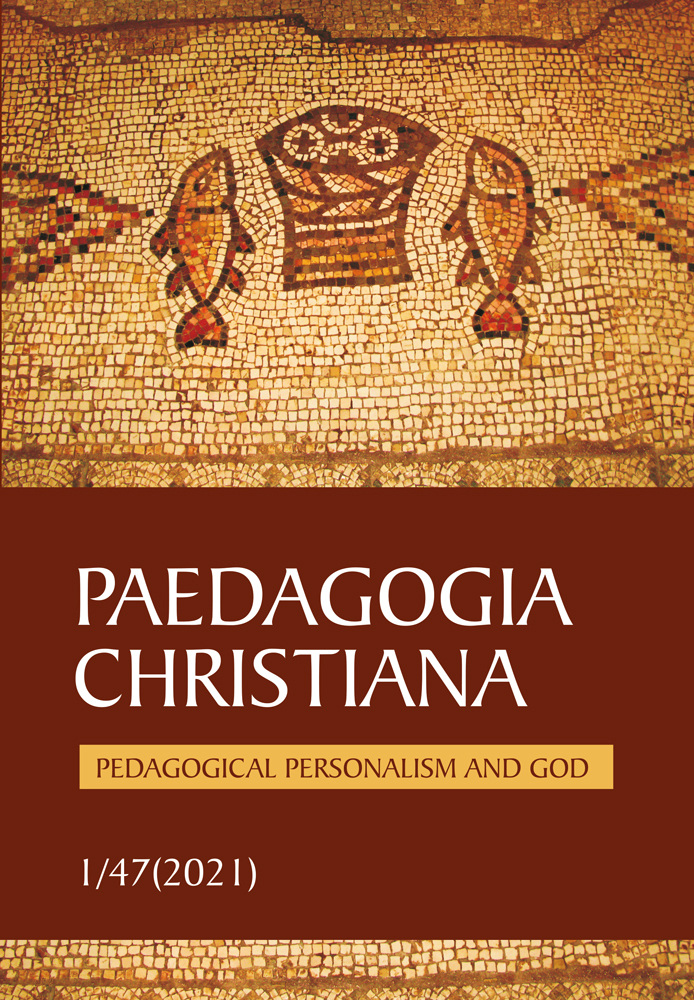Man–a Human Person in the Context of the Theory of Efficient and Purposeful Causality. Pedagogical Implications
DOI:
https://doi.org/10.12775/PCh.2021.002Keywords
theory of causality and pedagogy, transcendental pedagogy, teleological pedagogyAbstract
This article aims to justify the thesis about the need to develop transcendent, transcendental and teleological pedagogy in connection with the anthropological basis, which is the theory of the person and causality. A man–a person – is an ontically substantial individual being, demanding an external cause, which is the Pure Act of Existence–Transcendens–Absolute. The personalistic pedagogics and the pedagogy of the person are therefore inherently related to transcendence. If the subject and object of education is a human person, then transcendental pedagogy must be a sine qua non condition for practising personalistic pedagogics and pedagogy of the person. Personalistic pedagogics and the pedagogy of the person are also intrinsically related to teleology. Efficient cause is coupled with purposeful cause. If there is an action of the Absolute which results in the existence of a man, a human person, then the Absolute, as the fullness of good, is the ultimate goal-motive and final cause of the man–human person. The teleological aspect in personalistic pedagogy and the pedagogy of the person means a particular aim and meaning orientation; full realisation of potentialities and tasks dormant in a unique being–a human person. The goal is not to achieve perfection, but to direct to your original source – the Transcendent–the Absolute–God.
References
Aristotle/Arystoteles. (1973). Analityki pierwsze i wtóre [Prior and Posterior Analytics]. Transl. K. Leśniak. Warszawa: PWN.
Aristotle/Arystoteles. (1983). Metafizyka [Metaphysics]. Transl. K. Leśniak. Warszawa: PWN.
Augustine/Augustyn. (1996), O Trójcy Świętej [On the Holy Trinity]. Transl. M. Stokowska. Kraków: ZNAK.
Bartnik, Cz. (1995). Personalizm. Lublin: KUL.
Basil the Great/Bazyli Wielki (1999). O Duchu Świętym [On the Holy Spirit]. Transl. A. Brzóstkowska. Warszawa: PAX.
Basti, G. (1995). Filosofia dell’uomo. Bologna: ESD.
Boethius/Boecjusz. (2007). Przeciw Eutychesowi i Nestoriuszowi III [A Treatise Against Eutyches and Nestorius]. In Traktaty teologiczne. Transl. R. Bielak, A. Kijewska. Kęty: Wydawnictwo Marek Derewiecki.
Diogenes Laertios. (1982). Żywoty i poglądy słynnych filozofów [Lives of the Eminent Philosophers]. Transl. W. Olszewski. Warszawa: PWN.
Gogacz, M. (1981). Człowiek i jego relacje. Studia Philosophiae Christianae, 17/2, 185–198.
Gogacz, M. (1987). Próba heurezy subzystencji i osoby. Studia Philosophorum Medii Aevi, 8, 9–16.
Gogacz, M. (1997). Osoba zadaniem pedagogiki. Warszawa: NAWO.
Granat, W. (1961). Osoba ludzka. Próba definicji. Sandomierz: WDS.
Granat, W. (1984). Personalizm chrześcijański. Poznań: Księgarnia Św. Wojciecha.
Granat, W. (2007). Fenomen człowieka. U podstaw humanizmu chrześcijańskiego. Lublin: KUL.
Guardini, R. (1987). Persona e liberta. Saggi di fondazionedella teoria pedagogica. Brescia: La scuola.
Kierkegaard, S. (1972). Bojaźń i drżenie. Choroba na śmierć. Transl. J. Iwaszkiewicz. Warszawa: PWN.
Kierkegaard, S. (1976). Albo–albo. Vol. 1: transl. J. Iwaszkiewicz. Vol. 2: transl. K. Toeplitz. Warszawa: PWN.
Kowalczyk, S. (2002). Zarys filozofii człowieka. Sandomierz: WDS.
Kozłowski, R. (2005). Wokół problemu osoby. Definicje osoby w polskim personalizmie chrześcijańskim. Słupskie Studia Filozoficzne, 5, 79–93.
Marek, Z. & Walulik, A. (2017). Pedagogika katolicka w perspektywie pedagogiki transcendentnej. Horyzonty Wychowania, 16(38), 125–141.
Maritain, J. (1980). L’educazione della persona. Transl. P. Viotto. Brescia: La Scuola.
Mounier, E. (1935). Revolution personnaliste et communautaire. Paris: Fernand Aubier, Editions Montaigne.
Mounier, E. (1960). Co to jest personalizm. Kraków: Znak.
Nowak, M. (2008). Teorie i koncepcje wychowania. Warszawa: WAiP.
Possenti, V. (2015). Alla ricerca della natura umana (e della persona). In T. Valentini,
A. Velandi (Eds.), Natura umana, persona, liberta. Prospettive di antropologia filosofica ed orientamenti etico-politici (pp. 15–37). Citta del Vaticano: LEV.
Śliwerski, B. (2008). Pedagogika bez transcendencji. In W. Pasierbek (Ed.), Pedagogika ignacjańska wobec wyzwań współczesnego humanizmu (pp. 79–137). Kraków: WSFP Ignatianum, WAM.
Śliwerski, B. (2012). Pedagogika ogólna. Kraków: Impuls.
Spaemann, R. (2004). Ars longa vita brevis. Acta Philosophica, XIII (2), 249–266.
Spaemann, R. (2005). Persone. Sulla differenzatra ’qualcosa’ e ‘qualcuno’. Bari: Laterza.
Stępień, T. (2013). Wprowadzenie do antropologii filozoficznej Św. Tomasza z Akwinu. Warszawa: Warszawskie Towarzystwo Teologiczne.
Thomas Aquinas/Tomasz z Akwinu. (1954). In octo libros Physicorum Aristotelis expositio, ed. M. Maggiolo. Taurini.
Thomas Aquinas/Tomasz z Akwinu. (1975). Summa teologiczna [The Summa Theologica]. Vol. 1‒35. Londyn.
Thomas Aquinas/Tomasz z Akwinu. (2003, 2007). Summa contra Gentiles. Prawda wiary chrześcijańskiej w dyskusji z poganami innowiercami i błądzącymi [Summa contra the Gentiles, University of Notre Dame Press Notre Damme London]. Transl. Z. Włodek, W. Zega. Vol. 1. Poznań 2003. Vol. 2. Poznań 2007.
Tischner, J. (2011). Spór o istnienie człowieka. Kraków: Znak.
Valverde, C. (1998). Antropologia filozoficzna. Poznań: Pallottinum.
Wrońska, K. (2010). Człowiek w doświadczeniu wielowymiarowej transcendencji. In M. Nowak, P. Magier, I. Szewczak (Eds.), Antropologiczna pedagogika ogólna (pp. 175–188). Lublin: KUL.
Zdybicka, Z. J. (1972). Partycypacja bytu. Próba wyjaśnienia relacji między światem a Bogiem. Lublin: KUL.
Downloads
Published
How to Cite
Issue
Section
License
Copyright (c) 2021 Sławomir Chrost

This work is licensed under a Creative Commons Attribution-NoDerivatives 4.0 International License.
Stats
Number of views and downloads: 945
Number of citations: 0



